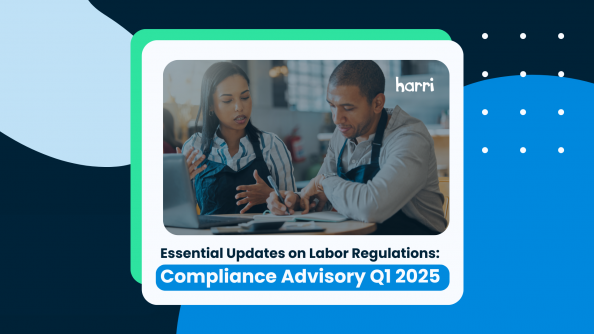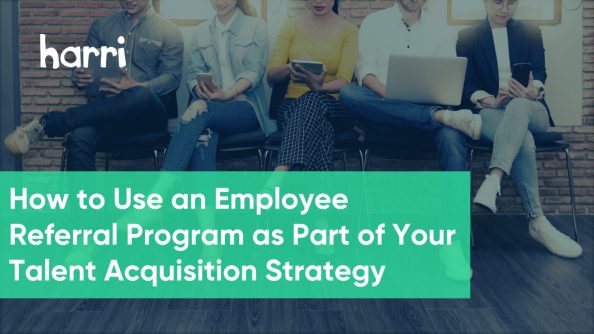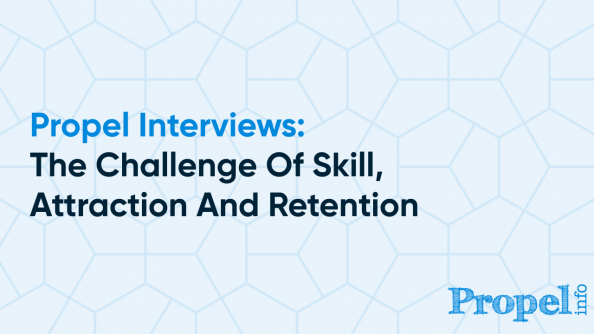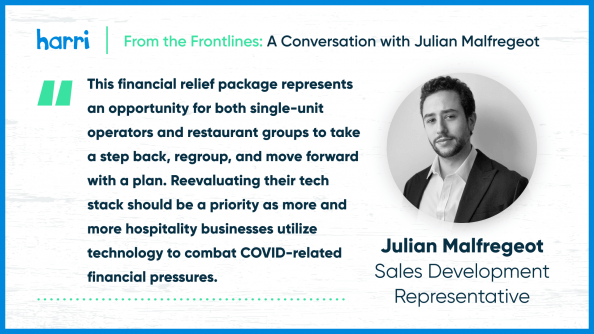Rebuild & Reinspire Hospitality Recruitment Summit | Session 1: Recruit
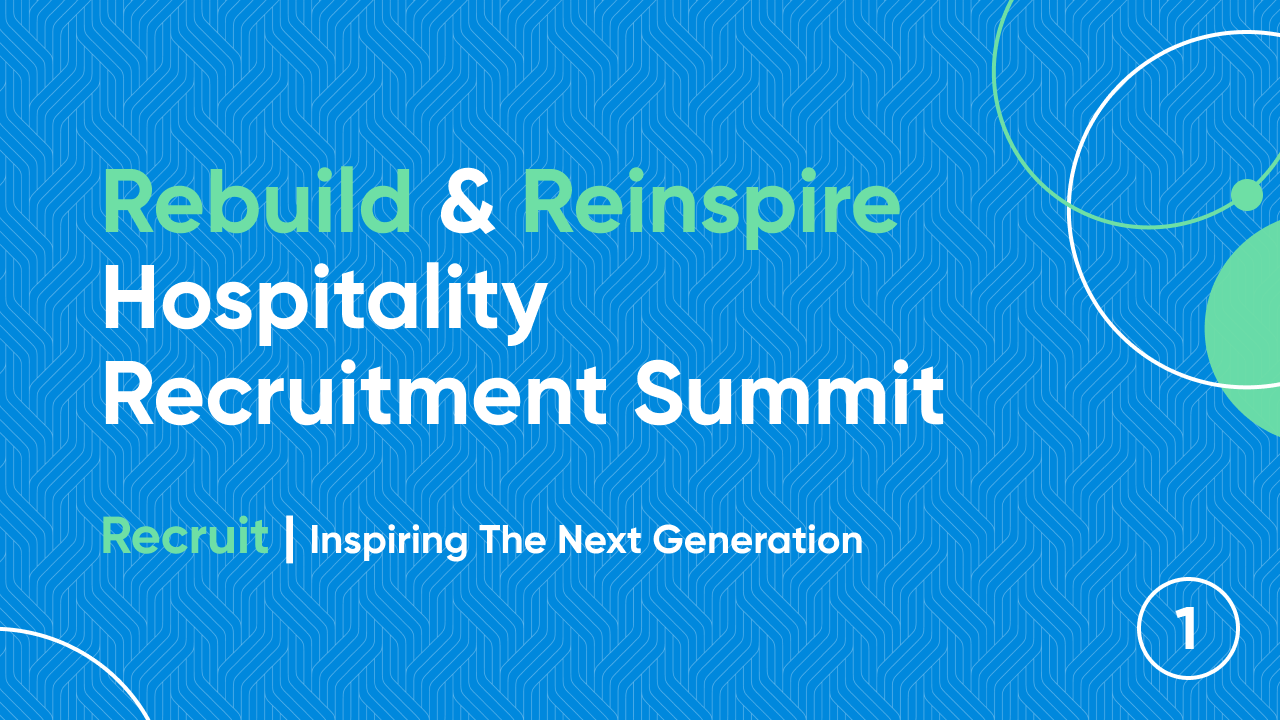
- By Harri Insider Team | June 9, 2021
Welcome to the Rebuild & Reinspire Hospitality Recruitment Summit, a virtual event comprising three sessions that directly address the ongoing staffing crisis in the hospitality industry.
In the first session, Louise Gallant, Community & Events Director at Harri, met with Kate Nicholls, CEO of UKHospitality, James Godwin, Resources & Administration Director at Harbour Hotels Group, Matt Hudson, People Director at Wagamama, Alex Reilley, Co-Founder and Executive Chairman at Loungers, and Nisha Katona, Founder, and CEO of Mowgli Street Food, to discuss the best ways to attract people back into the sector.
The expert panelists provided some innovative ideas and solutions throughout the session. This isn’t one to be missed — read on to find out what was covered.
By the numbers: COVID-19’s impact on hospitality
Kate Nicholls kicked off the summit by outlining the devastating effects of COVID-19 on the hospitality sector, “since the financial crash, we’ve generated 1 in 6 of net new jobs each and every year, and invested £10 billion in our high streets…that positive statement [was] absolutely devastated as a result of COVID. We are now a third of the size that we were in 2020.”
Nicholls continued to explain how the hard-hit industry has experienced a “28% drop in headcount,” with 660,000 fewer people now working in the sector.
Based on these numbers alone, it’s clear that if the hospitality industry wants to recover from the catastrophic effects of the pandemic, something needs to change, and fast.
Operators face recruitment challenges
Brexit, fears over the vaccine rollout, and growing uncertainty surrounding the new variants of COVID-19 have all created difficulties for hospitality operators.
According to Kate Nicholls, 50% of operators say they’ve experienced labour shortages, as well as challenges when recruiting and getting hold of the right people. And, even though around 85% of those on furlough are expected to return to the industry, the uncertainty around what will happen on 21st June is causing a lot of nervousness. Until then, operators can’t commit to full hours or even guarantee hours going forward.
Attempts were made early on in the pandemic to tackle these problems, such as UKHospitality’s partnership with industry initiatives to help staff find short-term work until venues reopened. But nobody could have predicted just how long COVID-19 would be with us.
Labour shortages aren’t slowing down
The panelists came together to discuss the effects of labour shortages on their businesses. James Godwin, from Harbour Hotels Group, started the discussion. He expressed that, like other operators, he wasn’t sure how many furloughed workers would come back to the industry. So, when the majority of staff did return, Harbour Hotels Group found itself having to be more flexible, which created recruitment challenges.
Adding to the discussion, Matt Hudson, People Director at Wagamama, explained that due to lockdown, the dining chain lost six months of internal progress in November, December, and the first quarter of 2021.
And, while the sector as a whole is facing issues, Alex Reilley from Loungers recognised that there are regional hotspots where recruiting is certainly difficult. He said, “it isn’t just about not necessarily being able to find the people, it’s being able to find people that can then afford to stay in the towns you’re trying to recruit.”
Nisha Katana, founder of Mowgli Street Food, joined shortly after, stating that we’re ‘not immune from the problem’ and that it will eventually “come to bite us” — particularly if the industry doesn’t act now.
The question is: how do operators overcome the challenges of COVID-19 and Brexit? Our panelists considered just that.
Collaboration is key
Kate Nicholls expressed that in order to recover from the effects of the ongoing pandemic, operators need to maintain the collaborative approach they’ve developed throughout the crisis.
“We’re a very collaborative industry,” said Kate, “but competing for talent and scrambling for talent doesn’t do any of us any good. We need to work positively and proactively to talk about the opportunities that we’ve got within hospitality.”
Alex supported this point, explaining how the pandemic is a “good opportunity to collaboratively understand, appreciate and put in place a 21st-century hospitality blueprint.”
Having said that, he also believes that the government has a role to play in all of this, adding, “they’ve been part of the negative PR issue that the sector has regrettably had, certainly in the last few years.” — and we couldn’t agree more.
The government must act
It goes without saying that unless the government acts quickly and provides the appropriate level of support, the hospitality industry will continue to struggle. The panelists were in agreement that for recovery to happen, the government needs to get behind the sector and talk positively about people returning to the industry.
“It all comes down to confidence and confidence comes from the government.” Kate emphasised. Alex added, “we’re in a position where the government isn’t giving us the right level of support.”
It was noted that if the government supports the industry, positively sets out its view on where hospitality can play a role in national economic recovery, and backs it as a career of choice, then the sector can continue to make positive contributions to recovery.
And that’s without taking into account the industry’s social and cultural value. Kate also pointed out that hospitality’s role in bringing health, wellbeing, and happiness to its customers, teams, and communities, should never be taken for granted again.
A reset moment for the hospitality industry
The ongoing pandemic has affected almost every role in hospitality, which is why many operators think we should use it as a reset moment. Kate believes the industry shouldn’t go back to business as usual. Instead, operators should think creatively about hours, shift patterns, and staff benefits to attract new talent.
That’s not all – she mentioned that we need to think differently about the way we construct jobs and training, as well as the support we give to people during these uncertain times.
Advice for operators going forward
While many operators are putting initiatives in place to attract people to the industry, the panelists agreed that transparency, honesty, and openness around the roles and expectations are key.
Additionally, Nisha Katona believes that the hospitality industry needs to aim for more than a gateway to employment, “I gave up my career to come to what I think is an incredibly exciting, noble industry. That’s how we want our people to feel.”
Katona makes a fantastic point, saying, “a lot of your resources have to go into how do you make that the most delicious environment to work in.”
And James agreed, noting that “laying out great career paths with fantastic opportunities for people” has to be the way forward. To achieve this and ensure future success, it’s important not to just look at the short term (filling gaps), but the longer term (12–24 months).
To find out more about how Harri can support your talent and recruitment strategy click here.







